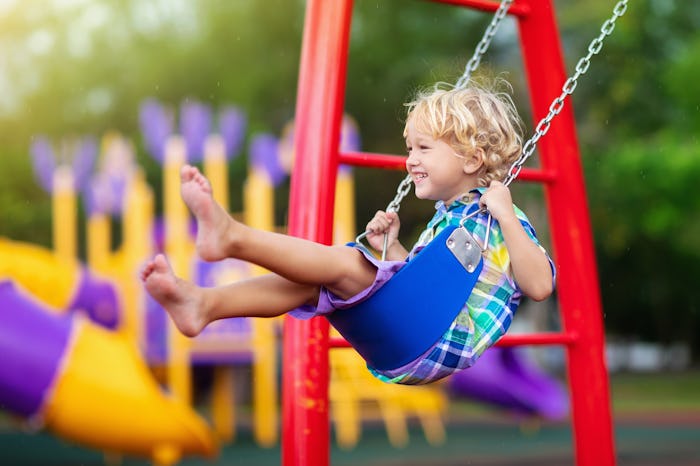Parenting

5 Ways Prioritizing Outdoor Play Is Vital To Your Kid's Wellbeing
Kids need more outdoor play to boost their social skills, health, and academic performance while connecting with their communities.
Kids play. It’s what they do. The problem is, too many of them mainly play indoors, which isn’t great for their development. In fact, there’s a name for this phenomenon: nature-deficient disorder.
Although nature-deficient disorder isn’t a recognized condition, it’s a real concern. A recent survey showed that most kids are getting outdoors just one hour a day, and when kids don’t spend time in green spaces, they can experience everything from higher stress levels to an increased chance of obesity.
The answer to this issue may be somewhat obvious: head outside regularly for fresh air and family fun. Though it might take some finagling of your schedule, it’ll be worth it. After all, outdoor play is vital to your kid’s well-being in several key ways, as outlined by a comprehensive guide from AAA State of Play, a leading supplier of commercial playground equipment. Here are a few compelling reasons to get your kids outdoors:
1. It Promotes Healthy Socialization Skills
Most kids are hard-wired to be social. However, that doesn’t mean that they understand society’s generally accepted rules of the road. Concepts like working as part of a team or taking turns don’t always come naturally to youngsters. AAA State of Play emphasizes how playgrounds serve as learning hubs for kids, helping them develop essential social skills.
When kids visit a playground, they encounter new faces, different challenges, and an array of personalities. As a result, they learn to navigate the social world around them. Ultimately, this encourages them to hone their problem-solving and interpersonal skills, as well as gain confidence when interacting with peers and adults.
2. It Fuels Healthier Living Habits
Feeding your family nutritious meals every day can be tough. Some days, it’s just easier to give into the demand for nuggets and fries. So be it. You shouldn’t feel guilty about occasionally offering kids treats, as long as they’re normally eating well and getting enough exercise. The only snag? Most kids aren’t getting the exercise they need. AAA State of Play highlights data showing that 13% of kids face challenges maintaining a healthy weight, reinforcing the importance of active outdoor play.
Spending time outside helps kids get the exercise their bodies need to burn physical energy, gain strength, find balance, and stay fit. By making it easy for your kids to access parks and playgrounds, you’re lowering their odds of dealing with the physical and psychological issues associated with being overweight.
3. It Connects Kids With Their Communities
Spending time shuffling from one indoor location to another can make it hard for kids to feel a true sense of community. Because they see the same faces and places all the time, they never really experience the diversity of their community. Yet when they head outdoors, they begin to gain a solid understanding and appreciation of the rainbow of surroundings just waiting to be discovered and explored.
For example, you might want to expose your kids to several play areas, if you’re fortunate to have many green options within walking or driving distance. These could include the adventure playland at your city’s largest park or the playground at an elementary school. The more green spots your kid gets to know, the broader his or her world will become.
4. It Can Spur Improved Academic Performance
Research shows a link between improved academics and nature play. For instance, there’s a correlation between nature-prompted information recall and better grades. And since routine outdoor play can reduce anxiety, kids who spend time outside may feel less overwhelmed when faced with a tough test.
True, grades aren’t everything. Nevertheless, you want your kid to be able to master as many academic skills as possible. Having competency across multiple disciplines encourages kids to develop more self-esteem as they get older. It also shows them that they’re not limited to one professional avenue. Instead, they can apply the creativity they use on the playground to their future career aspirations.
5. It Can Prompt Empathy And Inclusivity
Getting in tune with nature can expand a young person’s emotional perspective. For instance, kids on playgrounds will undoubtedly meet peers that are differently abled, especially if they visit play areas that are equipped with accessible equipment like adaptive swings and ADA-compliant elevated sandboxes. Playing side by side with kids who aren’t like them can boost their emotional intelligence and innate kindness toward others.
Hanging out with families from all backgrounds and experiences normalizes the practice of inclusivity, too. Kids who are accustomed to seeing others’ unique qualities learn to celebrate everyone’s one-of-a-kind traits. At the same time, they see themselves in new lights.
Finding Time For The Great Outdoors
Are there countless positive aspects of outdoor activity? Absolutely. However, you may find it tough to figure out how to “green” your kids’ playtime amid all your other obligations. A good way to start is by taking it slowly. If your kids are used to spending time in front of their screens, you may need to ease them into going outdoors for short periods each day.
Another tip is to stay engaged when you take your kids to the park or playground. Rather than sitting on the benches or under a shaded pavilion, get into the mix. Even if you’re not playing on the equipment, you can be a sideline supporter. Your enthusiasm will be contagious.
Finally, be sure to look around for adult-specific playground equipment. There are plenty of adult-focused products that commercial entities like townships, bureaus, churches, schools, and businesses install at their playgrounds. That way, you can also get the full mental and physical wellness benefits from being outdoors.
BDG Media newsroom and editorial staff were not involved in the creation of this content.